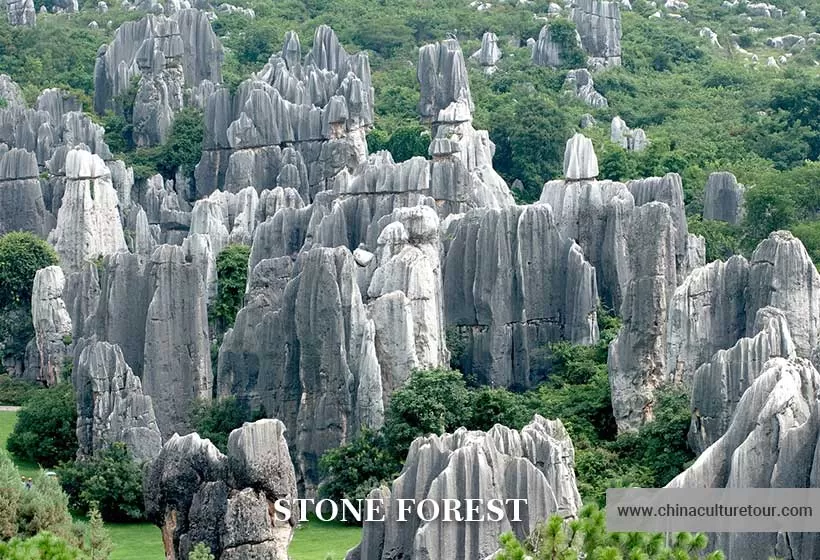Stone Forest Yunan
General Introduction
Lunan Stone Forest scenic area is located in Lunan County, which is about 100 kilometers to the east of Kunming (the capital of Yunnan province). Grotesque rock formations have contributed to the spectacular stone forest and dreamlike caves found there. The wondrous landscape is also scattered with tranquil and limpid, high-altitude freshwater lakes and rushing cascades. Lunan Stone Forest has these and more to offer. The simplistic lifestyle of the Yi people adds even more charm to this beautiful region. In 2007, Lunan Stone Forest was placed on the UN list of World Natural Heritage Sites.
The Stone Forest
The scenic area consists of seven smaller scenic areas called Big and Small Stone Forest, Naigu Stone Forest, Dadie Water, Changhu Lake, Moon Lake, Zhiyun Cave and Qifeng Cave.
The Stone Forest is revered for its peaks rising towards the sky. Looking at the scene from different perspectives will allow you to see changing beauty of the stones. The rugged stones rise quickly out of the ground and stretch high to the sky, giving a sense of awe to the visitors. If you stand on one of the stone peaks you’ll be able to overlook the towering stones that appear like a thick forest. Additionally, you’ll be amazed by the scattering crystal-like cascades crossing the stones. Meanwhile, the echo of running water is constantly heard as if you’re in a fairytale. The large-scale “forest” is rare throughout the world. Stones, caves and cascades are such a perfect combination that it has not failed to attract many visitors.
Ethnic Culture
The charm of Lunan Stone Forest not only lies in its unique natural landscape, but its local customs and practices. The people from different ethnic groups live in compact communities harmoniously through a simplistic lifestyle. Amongst them, Sani people, a branch of Yi people, are renowned for their diligence, gallantry and cordiality. For over 2,000 years, generations of Sani people have multiplied on this land, creating and shaping the distinctive and profound Yi culture. This culture is characterized by its name, “Ashima,” which has become a symbol of Yunnan province.
GREAT FAMILY CHINA TOUR
JULY 2024 We wanted to thank Grace at China Culture tour for organizing a great tour of China. We enjoyed our Beijing - Xian-Chengdu -Guilin -Yangshuo - Shanghai trip. Our local guides Bruce in Beijing, Susan in Xian, Jane in Chengdu, Mike in Guilin and Mary in Shanghai took care of us…read more details »
Teng Han L from SINGAPORE
Ready to Create a Unique Dream Travel?


